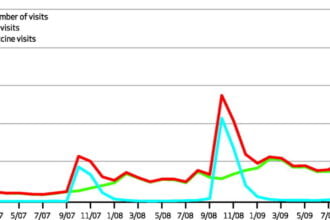The following appeared first in The Fiscal Times:
Holiday cheer and bipartisan bonhomie are still possible on Capitol Hill.
The following appeared first in The Fiscal Times:
Holiday cheer and bipartisan bonhomie are still possible on Capitol Hill.
For evidence, one need only look at the so-called “doc fix,” where Congress every year overrides a previous effort at health care cost control to ensure physicians get paid at least as much as they did the year before. Expect another present to arrive at physicians’ offices sometime between Thanksgiving and Christmas, now that the Super Committee has failed to permanently resolve the issue as part of Medicare’s contribution to long-term deficit control.
The heretical thought that the salaries of physicians who treat Medicare patients could be held in check dates from the mid-1990s. The optimistically entitled 1997 Balanced Budget Act created a “sustainable growth rate” (SGR) for physician reimbursement that said any increase in total pay for physicians could not exceed the growth rate of the rest of the economy.
That was wishful thinking, as it turned out. Health care costs and physician pay far exceeded economic growth, largely because of Medicare’s fee-for-service system. While the Center for Medicare and Medicaid Services could fix the reimbursement rate for the 7,000 price-controlled services offered by physicians, it could not put a brake on the quantity that physicians ordered.
“This system, which ties annual updates to cumulative expenditures, has failed to restrain volume growth and, in fact, may have exacerbated it,” the Medicare Payment Advisory Commission (MedPAC) noted in its non-binding recommendations to Congress in mid-October.
Total physician pay, which is a product of both price and volume, has exceeded economic growth every year since 2003. And every year, Congress has voted more money to ensure that the fees per service never go down. Last December, for instance, physicians’ fees were frozen at 2010 levels, which had been increased earlier in the year by 2.2 percent over 2009.
But as the economy steadily moved ahead, even at its recent tortoise-like pace, the gap between the legislated SGR and what doctors actually got paid grew larger and larger. Congress needed to come up with supplemental appropriations to close the gap. Last June, the Congressional Budget Office calculated it would $275 billion to maintain physician pay at current levels over the next ten years.
That’s right. Congress votes
and the president signs a
bill that counts ten years
of savings to pay for one
or two years of spending.
Since Democrats and Republicans on the Hill and the White House swear by “pay for” budgeting, closing that gap requires finding money somewhere else. Given the sky high total, it’s likely that this year’s fix – like last year’s fix – will be a one- or two-year stopgap measure that uses ten years of savings from some minor limits on spending in other parts of the Medicare program.
That’s right. Congress votes and the president signs a bill that counts ten years of savings to pay for one or two years of spending.
According to a CBO analysis published in June, a one-year freeze on physician salaries would cost $22 billion. But that would leave physicians facing an even larger cliff on Jan. 1, 2013 – a 34 percent gap between the legislated SGR and overall physician pay, up from 29.4 percent this year. That date also happens to be when the $1.3 trillion in sequestered budget cuts go into effect, and when the Bush-era tax cuts, from which most physicians derive significant benefits, expire. Median salaries for physicians in the U.S. range from $174,000 per year for family practitioners to $225,000 for surgeons, according to the Bureau of Labor Statistics.
The American Medical Association has spent most of the past year lobbying Congress to abolish the SGR. In testimony before the House Energy and Commerce Committee last May, AMA president Dr. Cecil Wilson lobbied for a pay increase, calling for setting rates high enough to equal to the growth of medical practice costs. “This will allow time to develop and test demonstration and pilot projects that would form the basis for a new Medicare physician payment system,” he said.
MedPAC’s recommendations were far less generous. It called for reducing payments for overpriced services, and a three-year, 5.9 percent annual reduction in pay for all specialties other than primary care, which would be followed by a freeze for seven years. On the other hand, primary care doctors, whom the health care reform law projects will play a major role in controlling costs by limiting unnecessary services, will have their pay stay the same for the full ten years.
“Taking into account the increase in the number of Medicare beneficiaries over the next 10 years and growth in the volume of services provided per beneficiary, total practitioner payments from Medicare would rise from $64 billion to $121 billion,” the report said. “On a per beneficiary basis, practitioner payments would continue to rise at an average rate of 2.2 percent a year.
The price tag for Congress and the administration under the MedPAC proposal would still be $200 billion over the next decade.
And where could Congress raise such sums from elsewhere within the program? MedPAC identified $50 billion in savings from previous recommendations like creating co-payments for home health episodes and limiting the increases given hospitals, dialysis clinics and hospices. It also identified $219 billion in potential savings that it hasn’t yet recommended, including $75 billion in reduced payments to pharmaceutical companies for drugs sold to Medicare beneficiaries who also qualify for Medicaid.
Given the powerful interest groups that would be hurt by any of those recommendations, don’t expect a permanent fix any time soon. The most likely scenario is for Congress to cobble together the $22 million needed to kick the can down the road another year.





